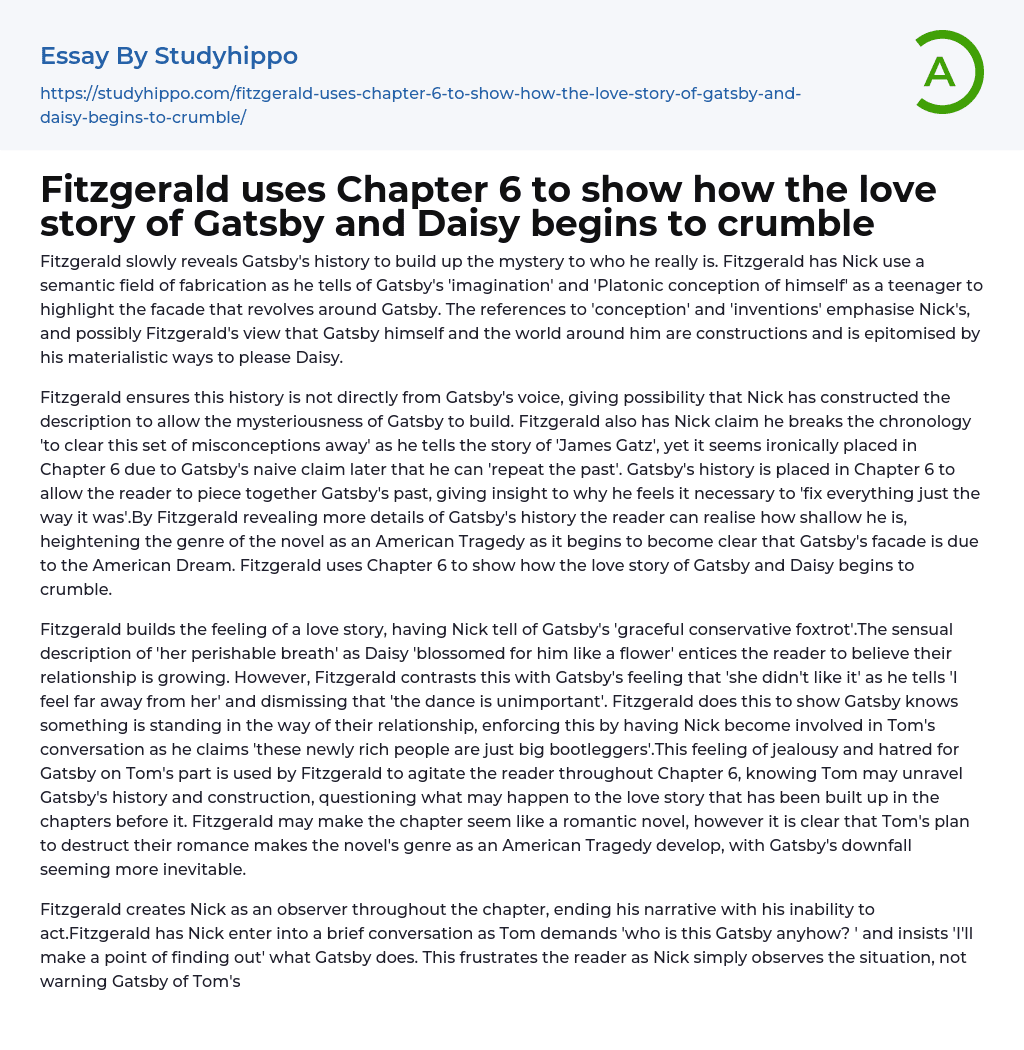

Unveiling Gatsby’s Mystery: Fitzgerald’s Use of Fabrication
Fitzgerald slowly reveals Gatsby's history to build up the mystery to who he really is. Fitzgerald has Nick use a semantic field of fabrication as he tells of Gatsby's 'imagination' and 'Platonic conception of himself' as a teenager to highlight the facade that revolves around Gatsby. The references to 'conception' and 'inventions' emphasise Nick's, and possibly Fitzgerald's view that Gatsby himself and the world around him are constructions and is epitomised by his materialistic ways to please Daisy.
Fitzgerald ensures this history is not directly from Gatsby's voice, giving possibility that Nick has constructed the description to allow the mysteriousness of Gatsby to build. Fitzgerald also has Nick claim he breaks the chronology 'to clear this set of misconceptions away' as he tells the story of 'James Gatz', yet it seems ironically pl
...aced in Chapter 6 due to Gatsby's naive claim later that he can 'repeat the past'. Gatsby's history is placed in Chapter 6 to allow the reader to piece together Gatsby's past, giving insight to why he feels it necessary to 'fix everything just the way it was'.By Fitzgerald revealing more details of Gatsby's history the reader can realise how shallow he is, heightening the genre of the novel as an American Tragedy as it begins to become clear that Gatsby's facade is due to the American Dream. Fitzgerald uses Chapter 6 to show how the love story of Gatsby and Daisy begins to crumble.
Fitzgerald builds the feeling of a love story, having Nick tell of Gatsby's 'graceful conservative foxtrot'.The sensual description of 'her perishable breath' as Daisy 'blossomed for him like a flower' entices the reader to believe their relationship is growing.
However, Fitzgerald contrasts this with Gatsby's feeling that 'she didn't like it' as he tells 'I feel far away from her' and dismissing that 'the dance is unimportant'. Fitzgerald does this to show Gatsby knows something is standing in the way of their relationship, enforcing this by having Nick become involved in Tom's conversation as he claims 'these newly rich people are just big bootleggers'.This feeling of jealousy and hatred for Gatsby on Tom's part is used by Fitzgerald to agitate the reader throughout Chapter 6, knowing Tom may unravel Gatsby's history and construction, questioning what may happen to the love story that has been built up in the chapters before it. Fitzgerald may make the chapter seem like a romantic novel, however it is clear that Tom's plan to destruct their romance makes the novel's genre as an American Tragedy develop, with Gatsby's downfall seeming more inevitable.
Fitzgerald creates Nick as an observer throughout the chapter, ending his narrative with his inability to act.Fitzgerald has Nick enter into a brief conversation as Tom demands 'who is this Gatsby anyhow? ' and insists 'I'll make a point of finding out' what Gatsby does. This frustrates the reader as Nick simply observes the situation, not warning Gatsby of Tom's detective duties. Fitzgerald epitomises Nick's inability to act, having him remember a 'fragment of lost words' after seeing Gatsby's intimacy with Daisy; yet Nick is unable to communicate as his lips 'made no sound' and what he 'had almost remembered was uncommunicable forever'.By doing this, Fitzgerald makes the narrative increasingly tragic as he highlights Nick's powerlessness as an observer; this also encapsulates the reader's helplessness as they
cannot intervene and prevent Gatsby's fate.
Therefore, Fitzgerald makes it clear Nick simply observes Gatsby's story throughout the novel and chooses not to act when he knows of Tom's jealousy, irritating the reader as they can do nothing.
- Aldous Huxley essays
- Alice Walker essays
- Amy tan essays
- Anne Bradstreet essays
- Anton Chekhov essays
- Arthur Miller essays
- Augustine essays
- Bertolt Brecht essays
- Booker T Washington essays
- Carol ann duffy essays
- Charles Dickens essays
- Charlotte Perkins Gilman essays
- Chinua Achebe essays
- Christina Rossetti essays
- Consider The Lobster essays
- Edgar Allan Poe essays
- Elizabeth Bishop essays
- Emily Dickinson essays
- Ernest Hemingway essays
- F. Scott Fitzgerald essays
- George Orwell essays
- Harper Lee essays
- Homer essays
- James Baldwin essays
- Jane Austen essays
- John Donne essays
- John Steinbeck essays
- Kate Chopin essays
- Kurt Vonnegut essays
- Langston Hughes essays
- Leonardo Da Vinci essays
- Mark Twain essays
- Mary Shelley essays
- Maya Angelou essays
- Nathaniel Hawthorne essays
- Oscar Wilde essays
- Percy Bysshe Shelley essays
- Peter Skrzynecki essays
- Phillis Wheatley essays
- Poets essays
- Ralph Waldo Emerson essays
- Ray Bradbury essays
- Richard Rodriguez essays
- Robert Browning essays
- Robert Frost essays
- Robert Louis Stevenson essays
- Seamus Heaney essays
- Sherman Alexie essays
- Sophocles essays
- Stephen King essays



